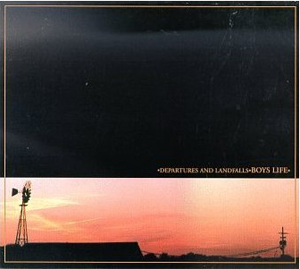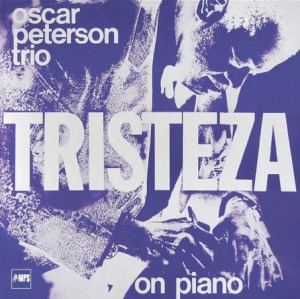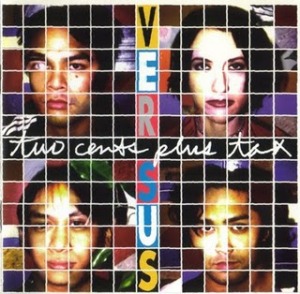|
Stereo Jack’s could’ve easily made a few appearances on this list (always coinciding with a trip to the nearby Boca Grande for a beef birria burrito), but on most visits I come out empty-handed. If I were more knowledgeable on jazz, perhaps that wouldn’t be the case, since their just-in bin is dominated by jazz and classic rock. I occasionally found a keeper in their stacks (Spinal Tap LP, Rex’s Rex for a few bucks, a Cocteau Twins LP) and today the winner was a copy of Boys Life’s Departure and Landfalls. Five bucks is a steal, but it also brought up the whole “Ten dollar minimum for credit purchases” issue, so without any cash on me, I opted to buy some cheap filler rather than venture off to an ATM. I searched through almost every LP in the hopes of finding a $5 LP I wanted to hear, but the highlights of the rock vinyl were things I already own (Colin Newman’s A-Z, Brian Eno’s Music for Films, L’altra’s Music for a Sinking Occasion), the jazz highlights were more expensive, and the seven-inches were overpriced, so I grabbed two cheap bin CDs and an Oscar Peterson LP for my wife.
97. Boys Life – Departures and Landfalls LP – Headhunter, 1996 – $5

Boys Life is one of the few Midwestern rock staples that I never got into, despite being highly praised by everyone else remotely interested in the scene. Why the delay? One pragmatic reason and one kneejerk reason: I simply didn’t run into their albums in stores and I associated them with the irritating bits of Crank! emo that I’d heard. The former issue has since been resolved by Mystery Train and Stereo Jack’s, respectively. That latter aspect is hard to admit in retrospect, but Brandon Butler’s vocals are the weakest part of Boys Life, which is par for the Crank! course. I fully expect people to call me out on this point, but think of it this way: how many bands sing like this nowadays? It’s all mid-1990s emo vocals, which involves mumbled verses (Soo-young Park style), surprisingly melodic choruses, and straining bridges. If I’d heard Departures and Landfalls in 1996, maybe I’d ignore this aspect or even cherish it as genuinely emotional (which, I suppose, it still is), but it’s not like I can go back to Hum’s Electra 2000 and not cringe when Matt Talbott reaches for notes on “Scraper.” The reality is that neither vocalist is consistently poor, nor do they ruin the otherwise excellent music on their respective albums, but there’s a reason why they kept getting better at singing on future records. Anyway.
Departures and Landfalls didn’t fully sink in until I gave it a focused listen with headphones. The first two songs, “Fire Engine Red” and “All the Negatives,” are up-tempo rockers with jittery nerves and jagged chords, but from there Boys Life spreads out and embodies the space that the Midwest has to offer. C-Clamp is my go-to band for picturing the drive through Illinois cornfields on I-57 from Chicago to Champaign, but that image has a specific time stamp. The golden guitar tones of Meander and Return work best along with a sunset, but the periodic growl of Boys Life’s guitars fit with a late evening drive. “Twenty Four of Twenty Five,” “Radio Towers,” and “Painted Smiles” all stretch out in quiet, determined ways, building toward an eventual explosion of light and then a gradual darkening. Bob Weston’s production is perfect for this record, giving it the necessary dynamic range to capture both ends of this spectrum. Weston fills Departures with nice touches like the ghostly echoing drums on “Sleeping off Summer,” the crickets in “Painted Smiles,” and his own trumpet on the same track. Butler’s vocals work best on these dynamic tracks, since he’s not forced to yelp over churning guitars. When he sings “Let me out of here today” on “Sleeping off Summer,” it’s a perfect blend of resignation and pleading. Departures and Landfalls didn’t grab me as quickly as I thought it would, but there’s no debating whether its placement in 1990s Midwestern rock is deserved.
Side note: I just noticed that Boys Life frontman Brandon Butler went onto form Canyon, a DC-area rock group whose self-titled debut was one of the CDs I reviewed back in my Signal Drench days. Furthermore, that record featured John Wall, the drummer from Kerosene 454 who kicked ungodly amounts of ass in that group. Butler was also in the Farewell Bend, a group who shared a split single with Shiner on DeSoto. I should probably unearth Canyon and track down that Farewell Bend full-length, huh?
98. Oscar Peterson Trio – Tristeza on Piano LP – MPS, 1972 – $2

When I met my wife during our freshman year of college, she had a fairly small binder of CDs. It was a mix of alternative rock she’d gleaned from Chicago radio, jazz that she’d heard from her parents and grandparents, and a few older favorites like the Beatles. She wasn’t as obsessed with music as I was/am, but she was intrigued by the existence of thousands of other bands that she’d never heard of, which was a huge step up from the usual scoffing of my high school classmates. That started my “I think you’d like this band, even if they’re not exactly my favorites” habit, which I believe started with the Get-up Kids. I’ve since learned to be far more careful with this habit, since there’s only so much feminine indie folk I can take at a given time. Fortunately I’ve found a reasonably large middle group in our tastes, usually encompassing non-aggressive indie rock, post-rock, and electronic music, while excluding hip-hop and metal. (She just confirmed this divide.)
I do think of my wife’s tastes when I’m out record shopping, however, and I picked this album up because of my wife’s fondness for Oscar Peterson, not knowing much about Peterson’s career arc. (If it had been an album called Oscar Peterson Trio by the post-rock group Tristeza, I would have been far better prepared.) My wife’s tastes in jazz differ heavily from mine; she doesn’t share my growing fondness for free jazz or fusion, instead preferring Peterson, Milt Jackson/the Modern Jazz Quartet, and other pianists like Thelonious Monk and Ahmad Jamal, Monk being a nice point of convergence.
I held off on listening to Tristeza on Piano until she was listening and could share some of her feelings on the album. From the first few paragraphs of the liner notes discussing the Brazilian flavor of the title track, I expected something different, but “Tristeza” is actually ridiculously fast jazz piano. I coined it “speed jazz,” which my wife viewed as a slight to Peterson’s technical prowess, which is pushed to its limits on that song and “Nightingale,” the only song on here that he composed. “Nightingale” does have some more typical Brazilian percussion, but both songs are driven by Peterson’s blazing hands. My wife was particularly impressed by his accuracy in these songs, since neither comes off as too fast or sloppy in the least. This style pops up occasionally during the rest of the album, but later songs like Gershwin’s “Porgy” and Jobim’s “Triste” have a more familiar pacing to what I’d heard from Peterson. My wife was impressed by both styles, but when pressed, she admitted that she preferred the more soulful style on the slower tracks, and I’ll agree with her on that point. I would’ve liked another original composition or two on the LP, but my wife was fine with hearing his rendition of “Fly Me to the Moon.” All told, she enjoyed Tristeza on Piano but wasn’t floored by it, and I think I’m in a similar state. Well worth the two bucks, at least.
I hadn’t noticed this before listening to the album, but Wikipedia notes that Tristeza on Piano was Peterson’s “eulogy of the recently deceased Jimi Hendrix and Janis Joplin, the Monterey Pop Festival stars.” I have a hard time processing exactly how it eulogizes them—the accelerated technical prowess of “Tristeza” and “Nightingale” certainly impress like Hendrix’s solos, but there’s no mention of it in the liner notes and nothing in the music itself that felt mournful.
99. Medicine – Shot Forth Self Living CD – Def American, 1992 – $2

I picked up this CD because of its constant mentions in “underrated shoegaze albums” discussions and it certainly delivers on my expectations. Female and male vocals, loads of gauzy guitar feedback, periodic bursts of white noise, some stretched-out compositions (the opener “One More” and the closer “Christmas Song” each go past eight-and-a-half minutes), and sweet pop hooks floating through the mist: calling Medicine a Los Angeles version of My Bloody Valentine isn’t far off. Those long tracks are the highlight, but the short, seemingly radio-friendly “Sweet Explosion” and “Defective” probably got them signed. I suspect that fellow Californians the Lassie Foundation hold this album dear, since a number of these guitar sounds recall moments from that group’s excellent 1999 album, Pacifico, minus the Lassie Foundation’s twee inklings, of course. Shot Forth Self Living is too structured to be pure shoegaze and too woozy to be stock 1990s alternative, but the drifting middle-ground between the two genres makes for an intriguing listen.
I’m tempted to scan in the artwork and annotate every facet of the art that’s typical to early 1990s major-label cut-out alternative rock. There’s the vague cover art, likely a negative of a photo of their favorite bar. There’s a colorized panel of a playground with an overlay of unconnected photos. There’s little consistency in terms of a color scheme. Even the all-caps font for most of the text (like they’d only use one font!) seems stereotypical to the era. My preference for vinyl is quite apparent, but the three-panel art of Shot Forth Self Living must’ve been designed with the confines of the compact disc in mind.
100. Versus – Two Cents Plus Tax CD – Caroline, 1998 – $2

Versus recently played a reunion show in Boston with a guest appearance from Unrest frontman Mark Robinson, but I passed on attending. While I enjoy the fuzzy indie rock of 1994’s The Stars Are Insane and parts of the more polished, but less compelling Secret Swingers (specifically “Lose That Dress,” “Glitter of Love,” and “Ghost Story”), Versus lost my interest as they gained fidelity. I’d heard a few songs from Two Cents Plus Tax early in the file-sharing era and enjoyed “Radar Follows You,” lazy rhyming and all (a consistent problem for Versus lyrics), but I missed the dynamics of “B-9” (which I first heard on the soundtrack to Half-Cocked, a fine indie-rock compilation) and the lilting pop of “Circle” and “Blade of Grass.” By the time of their 1999-2000 stint on Merge, I felt like they’d outstayed their welcome, especially given the number of 1990s indie rock bands who split around that time: Pavement, Archers of Loaf, Polvo, Seam, etc. Perhaps as penance for my MP3 of “Radar Follows You,” I grabbed this cheap copy of Two Cents Plus Tax for two bucks plus tax, hoping that I’d given the group enough time to sound fresh, but unfortunately it’s pretty much what I expected. At the very least it reminded me to give The Stars Are Insane a few spins in late summer, since it’s tailor-made for that season.
|

